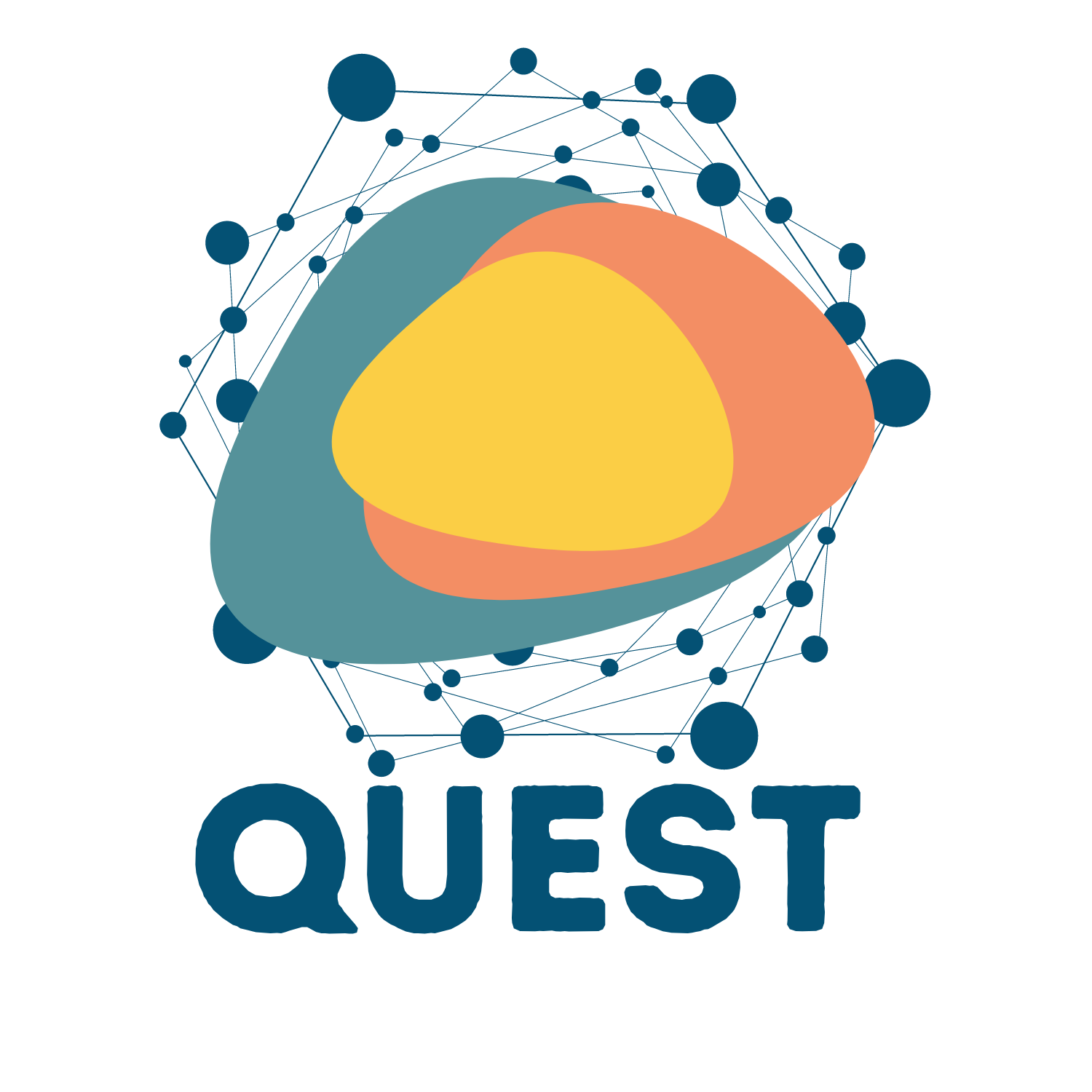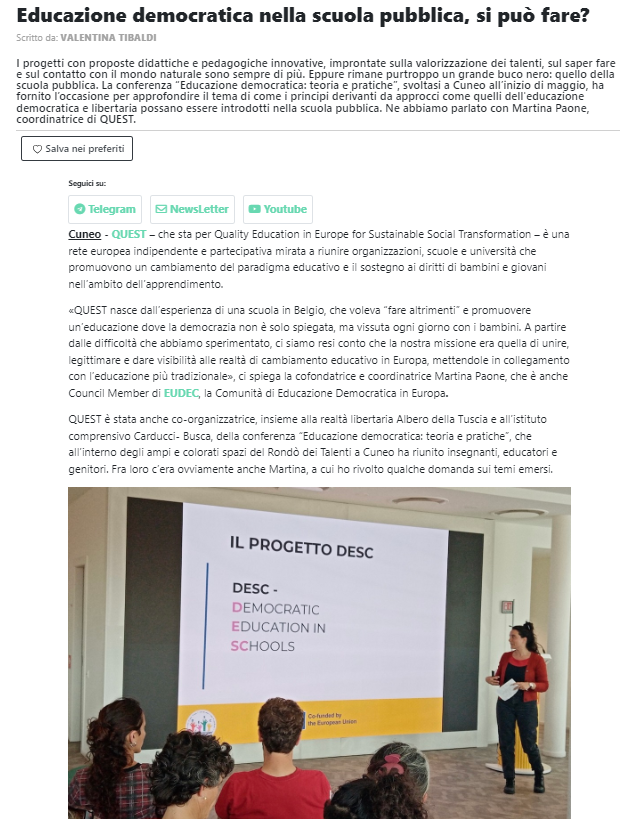*This article is a translation of the original article “Educazione democratica nella scuola pubblica, si può fare?”, published in the digital newspaper Italia che Cambia and can be read here
Projects with innovative didactic and pedagogical proposals, focused on the enhancement of talents, practical skills, and contact with the natural world, are increasingly common. However, unfortunately, a significant black hole remains: that of the public school system. The conference “Democratic Education: Theory and Practices”, held in Cuneo at the beginning of May, provided an opportunity to delve into the topic of how principles derived from approaches such as democratic and libertarian education can be introduced into public schools. We discussed this with Martina Paone, coordinator of QUEST.
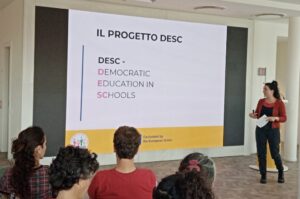
Cuneo (Italy). QUEST –which stands for Quality Education in Europe for Sustainable Social Transformation– is an independent and participatory European network aimed at bringing together organizations, schools, and universities that promote a paradigm shift in education and support the rights of children and young people in learning.
“QUEST was born from the experience of a school in Belgium that ‘wanted to do things differently’ and promote an education where democracy is not just explained but lived every day with the children. From the difficulties we experienced, we realized that our mission was to unite, legitimize, and give visibility to the educational change initiatives in Europe, connecting them with more traditional education”, explains co-founder and coordinator Martina Paone, who is also a Council Member of EUDEC, the European Democratic Education Community.
QUEST was also a co-organizer, along with the libertarian organization Albero della Tuscia and the Carducci-Busca comprehensive institute, of the conference “Democratic Education: Theory and Practices,” which, within the spacious and colorful Rondò dei Talenti in Cuneo, brought together teachers, educators, and parents. Among them was, of course, Martina, to whom I posed a few questions about the topics that emerged.
“Our work is based on promoting democratic education, grounded in the right of children and young people to participate and make decisions in their educational journey, sustainable education—in the sense of passing on care, responsibility, and connection with nature in education—and inclusive education, promoting social justice and removing barriers that discriminate against some children and young people in enjoying the full right to quality education,” explains Martina.
Principles and practices of democratic education: What are the main values?
The philosophy of democratic education is based on a new way—simple yet revolutionary—of seeing the child: children are considered individuals in their own right, free to shape their own lives. They possess innate curiosity and motivation to pursue their passions and learn, and can gradually take responsibility for their daily choices, what they do with their days, and what they learn. Parents and teachers—better called companions or facilitators—have full trust in these choices and support the journey of the young ones, trying not to impose their own guidance but to provide an environment rich in educational stimuli.
In democratic schools, children choose how to spend their time. They play freely, participate in the decisions of their educational community, immersing themselves fully in the school as part of “real life.” The main principles derived from this vision of the child are essentially two: respect for self-determination—children have full rights to choose what, when, and how to learn—and the school as a democratic community, in which children participate in the decisions of their community and their voices are heard equally as those of adults.
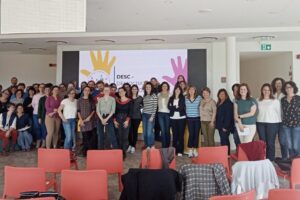
How does all this translate into practice?
There are many versions of democratic schools because the basic rules vary according to the choices of the educational community, and there are also many differences from one nation to another. Essentially, democratic schools have the Assembly as their decision-making center. It is the place where activities are proposed by adults and children, programs are created together, and the rules of the school are decided.
Depending on their age and interests, boys and girls take on increasing responsibility in the school, from organizational matters to proposing activities, to even teaching courses themselves. In Italy, we mainly talk about libertarian education schools. Originally inspired by the anarchist pedagogy movement, today libertarian schools converge with the democratic education model, and although the political inspiration at the base remains different, the educational practices are very similar.
The DESC project stems from the desire to merge democratic education with traditional schooling. Where does the idea/necessity for this come from?
The necessity arose from considering the obstacles that both democratic schools and more traditional/state schools face, and the possibility of finding a partial solution to these issues through meeting and dialogue. In fact, democratic schools in Europe are essentially small private organizations that require a tremendous effort from the founding group and rely entirely on parental funding. This generates fragility and often instability in the projects, not to mention that these are always privileged realities, accessible only to children from a socio-cultural elite.
On the other hand, statistics show that traditional schools are generally not suitable for helping students be satisfied with their lives and later with their jobs, nor for developing a sense of belonging to their school community. Despite calls from international organizations to renew the public education system, progress at the national level in Europe is still very slow. The DESC project aims to connect democratic schools and traditional schools in five European countries, to increase the visibility and legitimacy of democratic school experiences and to provide conventional schools with additional tools.
Is it possible to integrate principles of democratic education into public schools?
Applying 100% democratic education in the context of public schools is not possible. Although there are public democratic school experiences in Europe, it is always a mediation—referred to as “negotiated curriculum” experiences—between the freedom of choice for children and the respect for required curricular standards. That said, it is possible to introduce tools from democratic education into any type of school system to allow for greater freedom and responsibility for boys and girls.
Within the DESC project, we are currently working on a document of 50 practices inspired by democratic education, which can be implemented in any type of school. This list of practices comes from listening to public school teachers who requested very concrete tools and daily practices to bring into their classrooms.
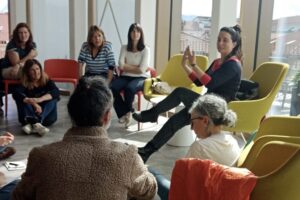
Do you believe that the partial introduction of democratic education practices can still be positive and bring benefits to children and young people in public schools?
I am convinced that every step towards listening to children and young people is positive and that every teacher can have a tremendous impact on their students’ well-being. Through democratic education, teachers can learn to change their approach, to be more attentive, trusting, and non-judgmental towards children, and to communicate empathetically. Another fundamental step for every teacher is the study of developmental neurobiology: how do children’s brains work? What stimulates their learning and what does not? It might seem obvious, but many teachers do not consider that a child whose basic needs are not met cannot learn effectively.
Democratic education teaches us to respect the needs of children above all. And this can be done in any classroom setting. What can be done in a traditional classroom context, for example, is to give students a choice on how they want to approach a particular topic, to dedicate as much time as possible to activities chosen by the students, and to allow space for the exploration of passions. Additionally, efforts should be made to involve students in the small and large decisions that can be made in the classroom.
What would you suggest to a teacher or a parent who wants to introduce democratic education practices?
I would say that the first step is to visit a democratic or libertarian school and talk to the children who attend them. You can check out the REL website for Italy, or the Creativity Garden by Canale Scuola. Seeing that these children are generally enthusiastic about going to school and being a fundamental part of it is proof that a non-coercive system fosters learning as well as well-being. Immersing yourself in the life of one of these schools for a day can help you understand how it works: how do they make decisions together? How do they choose which activities to do? How do they resolve conflicts? What role do the adults play? If you want to delve deeper, I recommend the training course we have created.
How can one obtain the resources and tools you offer?
Many resources can be found on our website. I recommend that interested schools or associations become members of QUEST: membership is free but based on the genuine interest of the entity in starting a path of educational change, even if small. Once members, they can access many free courses, training sessions, and exchanges. For example, we have just concluded an event on decolonial pedagogy, and this year we have planned courses on non-violent communication in schools, a conference on ecovillages and education, a workshop on climate justice, informational sessions on how to write European projects, and much, much more.
